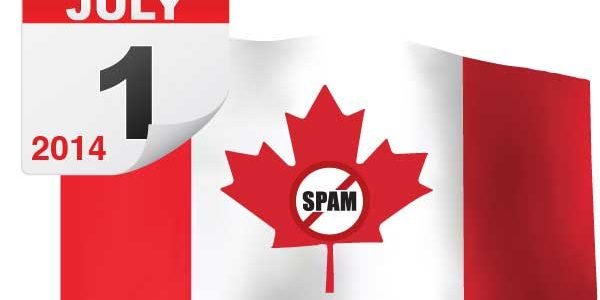No one likes receiving unwanted messages. They clog up your inbox and take time out of your day. In response, the Canadian government is unveiling the most aggressive anti-spam legislation the world has ever seen. While this is great news for recipients, it’s bad news for business owners.
Many will have to quickly adapt their marketing practices by July 1st 2014, when the new law takes effect. Imagine having a mailing list of 10,000 people (or more!) , and you’re not sure which ones gave you permission to ever email them.
Rather than analyzing the entire legislation, here is your business owner’s guide to staying out of trouble in this new climate:
The Facts:
- A brand new Canadian Anti-Spam Law (CASL) takes effect July 1, 2014.
- This law regulates the sending of commercial electronic messages (CEMs) to anyone in Canada. These messages promote an offer to purchase, sell or rent a product or a service. They include emails, tweets, website interactions, text messages, and other electronic communications.
- Those sending CEMs must have proof of implied or express consent of all recipients.
- They also must identify who they are and provide a clear unsubscribe method for those who do not want to receive any more CEMs from the sender.
- Failure to comply can result in fines of up to $1 million for individuals and $10 million for companies, and even jail time for those found in violation of the law.
How To Stay Out Of Trouble:
1. Clearly State Who You Are:
In every message, make sure that your name, email, phone number, and physical address are all clearly indicated. This information should be valid for up to 60 days after the message was sent.
2. Get Permission:
Whether you are sending newsletters through MailChimp, or Drip-feed Campaigns through 1CRM, you need to make sure that you have implied or express consent of each and every person you’re sending an electronic message with a commercial intent to.
This means that you should now be extra careful when buying mailing lists, and make certain that the proper consent has been given by those on the list, and that your list provider indemnifies you for any violations that result from the use of their list. After all, long-lasting customer relationships won’t be made with someone who does not want to communicate with you.
You might be wondering, what does implied or express consent mean? What scenarios are ok, and not ok? Here is a quick overview:
Implied Consent:
The following situations provide you with Implied Consent to send CEMs:
- The sender and the recipient have or had an ongoing business relationship within the two years preceding the date the message is sent.
- The recipient asked the sender about products, goods or services during a 6-month period preceding the date of the message.
- The recipient has conspicuously published his or her electronic address without stating that he or she does not wish to receive unsolicited CEMs, and the message should be relevant to the recipient’s employment or business. (Only the first email – not a series of emails.)
- The existence of a private relationship between the sender and the recipient within a two-year period before the message was sent.
Express Consent:
You have Express Consent to send CEMs to a recipient that…
- Actively signed up on your website
- Agreed in a sales contract
- Gave consent over the phone
- Responded affirmatively to an email
- Signed up at the point of sale
3. Allow Recipients to Unsubscribe:
While Express Consent never expires, recipients must always be given the option to unsubscribe from future CEMs. There should be a clear button or link on every CEM, where the recipient can easily unsubscribe for up to 60 days after the email was sent.
4. Loopholes:
- Know where your contacts are based. If they are not within Canada, then this law does not apply to those recipients. Although they won’t be as extreme as this new legislation, you are subject to anti-spam laws in whichever country they do reside in.
- Phone calls, snail mail, voice messages and faxes are exempt. So, after July 1, if you want to approach a prospective new client with whom you have had no prior relationship, it’s safer to make a phone call than to send an email. Text messages fall under the legislation.
- Registered charities and Political candidates or organizations are exempt from these laws.
Final Thoughts:
Consider sending a mass email to everyone you would send CEMs to before July 1st 2014 with an unsubscribe feature, asking any whom do not wish to be receive messages with a commercial intent from you (or your company) to kindly unsubscribe now. Some leeway will be given to companies that can demonstrate they at least tried to comply with the new law.







